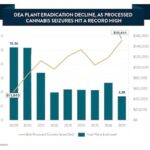Going in Circles Over ‘The Hemp Loophole’

DEA Plant Eradication Decline, as Processed Cannabis Seizures Hit a Record High
September 9, 2018
Recognizing Banking Risks in Emerging Cannabis Business Ventures
September 15, 2018California’s crackdown on CBD in food may be toothless
By J.J. McCoy, Senior Managing Editor for New Frontier Data
In July, the California Department of Public Health’s Food and Drug Branch (CDPH-FDB) threw the burgeoning cannabidiol (CBD) industry into some frenzy by issuing a revised FAQ on CBD in food products, declaring that it cannot be added to any, even if it comes from legal hemp. The move thus signaled California’s intention to block the sale of hemp-derived CBD products — almost already ubiquitous in the state, whether through health-food stores, juice bars, yoga studios, or beer breweries — in a national market which Hemp Business Journal projected to be worth nearly $2 billion in consumer sales by 2020.
The announcement specified that CBD sourced from industrial hemp must not be added to food or drinks, whether for humans or pets: “[A]lthough California currently allows the manufacturing and sales of cannabis products (including edibles), the use of industrial hemp as the source of CBD to be added to food products is prohibited. Until the FDA rules that industrial hemp-derived CBD oil and CBD products can be used as a food, or California makes a determination that they are safe to use for human and animal consumption, CBD products are not an approved food, food ingredient, food additive, or dietary supplement.”
The state’s Health and Safety Code defines food as “a raw, cooked, or processed edible substance, ice, beverage, an ingredient used or intended for use or for sale in whole or in part for human consumption, and chewing gum.” The CDPH-FDB elaborated what it would not allow: Any CBD products derived from cannabis; any CBD products, including CBD oil derived from industrial hemp; hemp oil not derived from industrial hemp seeds; or industrial hemp seed oil enhanced with CBD or other cannabinoids.
Nevertheless, U.S. marketers of hemp-based cannabidiol (CBD) have reason to remain encouraged about the market. Attorney Bob Hoban of Denver-based Hoban Law Group sued the DEA on behalf of the Hemp Industries Association and others to invalidate a new drug code for cannabis extract. Though a three-judge panel of the Ninth Circuit U.S. Court of Appeals denied the petition on April 30, Hoban nevertheless declared it a “home run.”
Why the optimism? It seems that the FDA is reluctant to prosecute over CBD supplements because of “the hemp loophole” — the fact that hemp products (which naturally contain CBD) are legal for import and consumption in the United States.
As Hoban explained, cannabinoids like CBD have never been scheduled. That means (as observed in the Ninth Circuit’s decision) that “the Agricultural Act contemplates potential conflict between the Controlled Substances Act and preempts it.”
“That makes it very clear that hemp-derived products—including cannabinoids—are not controlled substances at all,” asserted Hoban, whose team asserted that California’s CBD rule contradicts its own state law regarding hemp’s legality. An FAQ on the California Industrial Hemp Program website specifically defines hemp as legal, including “every… preparation of the plant.”
“These products are established in the state of California, and they’re lawful,” contends Patrick Goggin of Hoban Law Group. “Enforcement action would invite litigation.”

J.J. McCoy
J.J. McCoy is Senior Managing Editor for New Frontier Data. A former staff writer for The Washington Post, he is a career journalist having covered emerging technologies among industries including aviation, satellites, transportation, law enforcement, the Smart Grid and professional sports. He has reported from the White House, the U.S. Senate, three continents and counting.




